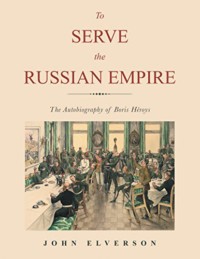Title: To Serve the Russian Empire
Subtitle: The Autobiography of Boris Héroys
Author: John Elverson
Publisher: AuthorHouse UK
ISBN: 1546284605
Pages: 278
Genre: Biography
Reviewed by: Dan Macintosh
Pacific Book Review
There are times when one just wishes to be a fly on the wall, and Boris Vladimirovich’s autobiography, To Serve the Russian Empire: The Autobiography of Boris Héroys, is just such a time. Vladimirovich’s life spanned two very distinct periods in Russian history. He served his country during the Tsarist era, but also lived long enough to witness the beginning of the Soviet era. He died in 1942, and his tombstone reads: ‘Soldier and Artist.’This is because he was not just a lifelong soldier, but also a talented painter.
Vladimirovich was the writer of John Elverson’s grandfather, and we learn that Elverson not only respected Vladimirovich’s military history, but also shared a similar military history. Elverson’s father, a Russian speaker, acted as the book’s editor by removing some of the more personal family content from the book. The result is a personal recollection of an intriguing era.
Although this is a book about a fascinating life, there are nevertheless mysterious holes in the overall picture it presents. “There is a strange lack of information about Boris’ counter-revolutionary activities both in Russia and in England between his leaving the World War I battlefront in Austria and starting his new life as an artist in England,” Elverson writes. Certainly, he had strong feelings about the pre-revolutionary Russia, having served in the upper echelons of its military, and having witnessed the grandeur of that era. One must wonder, though, why he didn’t tell us more.
You can sense his horror, however, when he writes about some of the revolutionary destruction he witnessed in 1918. Speaking of the Bolsheviks, “…they noticed in wonder that the Military Academy, which was continuing its life more or less as before,” and then, “they sent in the sailor-murderers, who had just returned triumphant from Crimea. The Academy was torn to shreds in one day. Portraits were cut from their frames and turned into table cloths for bread and butter.” This was after the revolution of 1917, but it illustrates the absolute repudiation of the past by the Bolsheviks, and their devotion to a far different future. His description of these Bolsheviks as “sailor-murderers,” says it all.
It’s amazing Vladimirovich even survived this pivotal transfer of power, especially with his high-profile military history. Elverson writes, “At one time, the Reds came to search his rooms, he escaped out of the window and stood in the niche of a blank window, until the search was over.” But is it any surprise that his esteemed military man would resort to such daring-do? Of course not!
Books like these give a wonderful glimpse into period few of us witnessed. We should be thankful Elverson has compiled this autobiography with such loving care and respect. It’s a reminder that history is not just a series of dates and places, the way some of our poorer history teachers have presented it to us but comprised of real flesh and blood. Elverson’s work puts meat – if you will – onto history, and makes it come alive. His grandfather was not just a faithful soldier, but a perceptive witness to the world as it was changing rapidly. There’s a lot of detail in this book that might go over the heads of those not already well versed in Russian history. However, you don’t have to be a history buff to appreciate its big picture. With Russia being a major player in current geopolitics, knowing this fabled land’s history will only help you appreciate it more. This is a book that will teach you a lot of history, and hopefully make you want to know even more.


